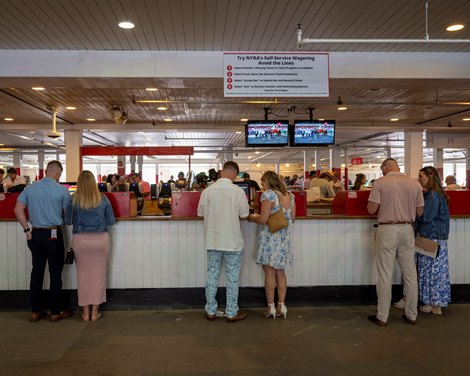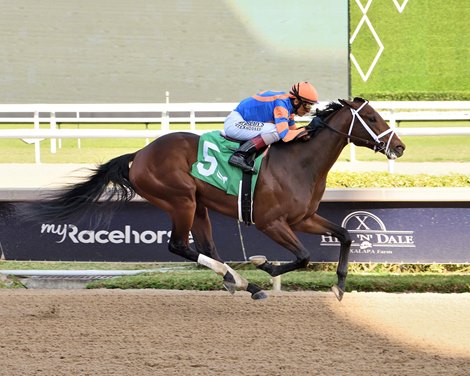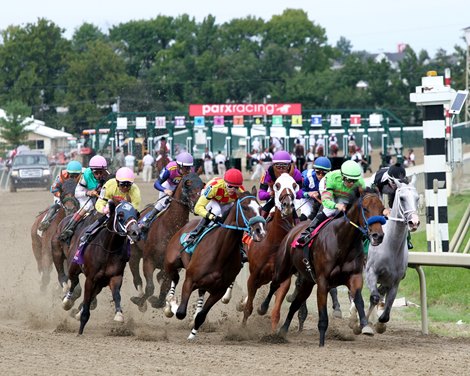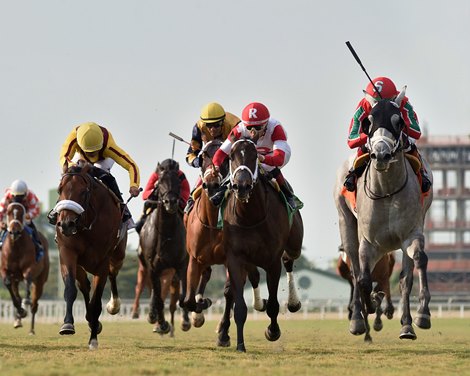Based on a panel discussion at the Racing and Gaming Conference at Saratoga Aug. 14 on fixed-odds wagering for United States racing, there’s little hope such wagers will be added in a widespread manner anytime soon although the majority of the panel would like to see such a move.
For years Nevada had largely been the only state where fixed-odds wagering on sports could be offered but a Supreme Court decision would change that. Considering it’s been more than six years since that decision paved the way for other states to allow fixed-odds wagering on sports, and in that time more than 30 states have joined the party, Wednesday’s conversation certainly didn’t suggest any urgency to move forward with fixed-odds wagering on racing.
There have been a few changes. In February Colorado became the first state to allow fixed-odds wagering on horse racing through mobile platforms (Bet365 offers the content) and New Jersey has fixed-odds wagering at Monmouth Park. Still, the vast majority of wagering on U.S. racing (within the U.S.) has continued to be through pari-mutuel wagering—in which bettors compete against one another after a percentage is taken from the pools to pay tracks, horsemen, advance-deposit wagering providers, rebates for large bettors, and taxes.
Fixed-odds wagering lets the bettor know ahead of time what the payout will be if they select say, the Dallas Cowboys over the Philadelphia Eagles, or in the case of racing, Dornoch to win the Belmont Stakes (G1).
As racing depends on wagering for revenue, such deals would have to include a percentage of money going to the industry: largely tracks and horsemen. Also, major track owners such as Churchill Downs Inc., 1/ST Racing, and the New York Racing Association all have ADW platforms on the pari-mutuel side and would have to consider the impact on those operations.
Joe Asher, former president of sports betting at gaming supplier IGT and chairman of The Wilson Center, said because racing is regulated from state to state and agreements also would need to be reached with industry players—tracks and horsemen—it will be “mind-boggingly complicated” to get it going on a widespread basis throughout the country.
“I just think it’s very hard to get it done within the U.S. regulatory system,” Asher said. “So I come back to how do you present sports bettors with a way to bet the next race with an informed opinion that’s all right there in the app? Let’s make sure that with little effort they can make the bet. That’s where my focus would be.”
Providing access for sports bettors to pari-mutuel wagering on races is an approach that has been adopted, at different levels, by two of the country’s major sports betting apps: FanDuel and DraftKings. The FanDuel app is the most advanced in this category, offering players a shared wallet to their pari-mutuel wagering.
Earlier this year FanDuel reported that on Kentucky Derby (G1) day it saw 200,000 bettors wager on horse racing for the first time. With the shared wallet in place and race wagering a click away, that performance followed a heavy marketing push for the Derby. Panel member Tom Cassidy, industry relations senior manager at FanDuel, noted that his company has interests in fixed-odds wagering and pari-mutuel wagering.
With that in mind, FanDuel has tried to support both with the shared wallet and marketing. In explaining this compromise of sorts, he noted that it’s never one entity that can just move forward on changes such as adding fixed-odds wagering on racing.
“It feels like fixed odds would bring some changes to the current landscape,” Cassidy said. “I think that’s the big thing: making sure that everybody is comfortable with what it would look like and what those changes would bring. Not to take the easy way out here, but it has to make sense for everybody involved in order for it to be a viable product.”
DraftKings has a pari-mutuel app called DK Racing (in partnership with CDI). Chris Cipolla, general manager of horse racing for DraftKings, said he’d like to see easier flow between the two as a way to increase wagering on horse racing.
“We got strong engagement in racing but with the layers of friction, we saw a lot of fall-off as we were cross-selling out of the sportsbook,” Cipolla said. “Credit to FanDuel, they’ve done a great job of removing those friction layers and that’s what we’re working toward as well.”
Panel member Matt Cosgriff, director of retail wagering, and customer analysis for BetMGM, is more optimistic that eventually fixed-odds wagering on racing will be offered alongside the other sports on all of the major platforms.
“It’s coming in,” Cosgriff said, noting the additions in Colorado and New Jersey and mentioning that it’s silly that he can go to an international platform and put a fixed-odds wager on Saratoga Race Course but can’t do the same in the U.S. “I think success breeds success (and this has worked) when you look at the rest of the world.”
Panel moderator Michele Fischer, vice president of SIS Content Services which is providing track content in Colorado, noted that the state is gaining traction in its fixed-odds wagering on racing. (Numbers are expected soon.)
Panelists agreed that horse racing has something to offer in that races occur at times that other sports are not available and it doesn’t take long for the outcome to be determined. Cipolla noted that the ultimate removal of “friction,” would be putting racing side by side with other sports on the fixed-odds platform. And he added that pari-mutuel wagering would continue.
“We’re very excited about fixed-odds, but we don’t offer it yet,” Cipolla said. “The fixed odds make a lot of sense just because our customers are used to it. The pari-mutuel learning curve, especially for a non-horseplayer, takes education. It takes time.
“We do think it’s important to have the content. When we talk about horse racing, we’ve found that the top-tier horse racing content gets the most engagement. It’s the easiest for people to relate to. I think it’s a very important piece to the fixed-odds wagering and once that content is available, it can live side by side with the pari-mutuel offering.”
Cipolla noted that fixed-odds wagering could provide some basic bets not typically available on the pari-mutuel side, such as how many wins a jockey or trainer might have on a given card. Those types of basic bets could help bring people to the sport.
In a panel on the pari-mutuel tote that started the day’s sessions Wednesday, Keith Johnson, president of AmTote, suggested that pari-mutuel wagering, in fact, could soon move more into the sports betting side. He said pari-mutuel wagering is better suited to offer complicated, multi-leg wagers.
“I think offering pari-mutuel wagers with those same sportsbook operators on certain types of sporting events are better facilitated through pari-mutuel, namely, events that have lots of outcomes that are hard to price and hard to handicap that should have lots of markets and submarkets that are currently being underserved because they’re just really hard to implement in a fixed-odds fashion,” Johnson said. “That’s something that we can do with the sportsbook operators. It’s kind of outside of horse racing, and I think you’re going to see more of that. We’ve done some of that internationally already with soccer pools with some success. I think more can be done.”
Johnson said to expect an announcement on more efforts in this area within the next few weeks. He also noted that he believes fixed-odds wagering can work in racing but it has to be implemented in a creative way. He said it provides an opportunity to grow the pie of overall players interested in betting on horse racing.
Such an increase is needed in a sport that in 2023 saw total pari-mutuel wagering register a number similar to that of 2009—and that’s not even factoring in inflation. Those hopes were outlined Wednesday, at a meeting conducted more than six years after that Supreme Court decision paved the way for fixed-odds sports betting.










Leave feedback about this